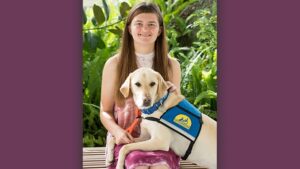Hanalei has made a huge difference in Makenzie McGuire’s life – so much so that she can leave home and go away to college with confidence.
“When I have Hanalei with me, I feel much more confident and relaxed,” McGuire says. “I can go to college knowing I’ll be safe.”
Hanalei is McGuire’s hearing dog – a yellow Labrador/golden retriever who alerts her to the telephone ringing, her alarm clock, dropped items, people calling her name, door knocks and doorbells, toaster popping, oven and microwave beeping and much more. “She also helps me relax much more in public as I can watch her body language, and that tells me a lot about what is happening around me,” McGuire adds.
McGuire, of Alabaster, was diagnosed with moderate hearing loss in both ears when she was two years old. She now has cochlear implants, which isn’t a cure, but the implants and speech therapy has enabled her to speak like any normal hearing person and interact with others.
As she began her senior year of high school, she and her parents knew she would need some extra support to go to college and live on her own. “I hadn’t even heard of hearing dogs before,” McGuire says. “I was doing some random research on Helen Keller and I saw that she supported hearing dogs. I was really curious and began researching it more and decided I wanted a hearing dog.”
Hanalei was bred and trained by Canine Companions for Independence, a Santa Rosa, California-based organization with six regional centers. The southeast region headquarters is based in Orlando serving eight states, says Martha Johnson, regional public relations/marketing coordinator. McGuire heard about the organization from a local volunteer puppy raiser.
Canine Companions is the largest nonprofit provider of assistance dogs in the U.S. and is known worldwide. The organization provides expertly trained assistance dogs to children, veterans and adults with disabilities and the dogs serve people with a wide range of disabilities, including multiple sclerosis, cerebral palsy, hearing loss, spinal cord injury, stroke, developmental delay and more. There are 3,000 volunteers nationwide, and the group has graduated 5,672 teams since its founding.
Canine Companions for Independence does not charge for assistance dogs or the lifetime of ongoing support it provides. The 501 (c) (3) non-profit depends on private funding through donations from individuals, corporations, foundations and community organizations. Its professional staff is supported by a national network of thousands of volunteers and donors, all committed to enhancing the quality of life for people with disabilities.
Dogs are bred in Santa Rosa and when eight weeks old, they are placed with volunteer puppy raisers across the U.S. who teach them up to 30 basic commands. When the puppy is about 16 months old, the volunteer returns the dog to one of the organization’s regional training centers for six months of professional training. In that training, the dogs are taught more than 40 commands, including retrieving items, pulling wheelchairs, turning light switches on and off, opening and closing doors and more. When the dogs complete the training, the dogs enter team training, where recipients are matched with their new assistance dogs and learn to work together as a team.
“People apply for a dog, and we learn a whole lot about them in that time,” Johnson says. “We always say the dogs are trained…so now we need to train the people.”
During training, the recipient can learn how to work with and benefit from an assistance dog, with daily lectures, exams, practices and public outings. A graduation ceremony is held at the end of the training that celebrates the new life together. There are 2,265 active graduate teams nationwide, with 403 teams graduating in 2017. There are at least 450 people currently on their waitlist for a dog. Since the group’s founding in 1975, more than 5,600 teams have graduated.
“We did not get to choose the dogs at team training,” McGuire says. “I truly believe the dogs chose us. During the first three days of working with different dogs…I finished sound work with Hanalei and went to sit back down. Instead of going back to the trainer, she came over to me. So I truly believe she chose me.”
McGuire plans to attend Auburn University this fall to become a veterinarian. “My parents are thankful for me to have her,” says McGuire of Hanalei. “My mom says all the time how she notices how much more confident I am. They also feel much more confident about me going to live on my own and be safe. I do not have to be constantly hyper-vigilant since I know Hanalei will tell me what is going on. I can go to college knowing I’ll be safe in case of fire or tornadoes.”
Lori Pruitt is associate editor of Birmingham Parent.





